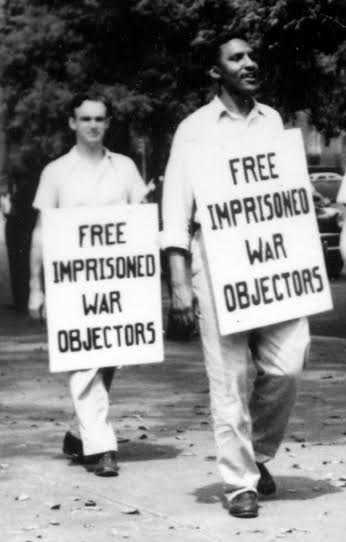
Bayard Rustin, right, at a protest in Washington, D.C., during the mid-1940s. Photo courtesy of Walter Naegle
Some aggrieved Christians are threatening civil disobedience these days over the gay marriage issue. More broadly, the issue of conscientious objection rights for dissenters in various fields, from pharmacy to cake baking, is increasingly important. It seems like a good time to offer a little ethical analysis.
Here is one way the issue can be formulated from a religious perspective:
If a government mandates what God forbids, or forbids what God mandates, civil disobedience may be required.
Imagine a government mandating that each couple sacrifice their first-born child to the gods. Or imagine a government forbidding membership in a Christian church.
In the first case civil disobedience involves the refusal to do what government commands, and in the second case it involves the continued practice of an act that government has banned.
This is a good time to say that civil disobedience is not confined to the religious. Substitute the word “conscience” for God in the sentence above, and the outcome is the same. Many non-religious people have practiced civil disobedience.
Civil disobedience sits at a kind of midpoint between more mild and more severe forms of dissent. On one end of the spectrum are those who simply offer grumbles, verbal protests, or street marches that do not break any laws. On the other end of the spectrum are those who move into sabotage, armed resistance, or revolution.
Civil disobedience, as Martin Luther King liked to point out, demonstrates respect for law even while breaking it. That’s because civil disobedience involves public lawbreaking accompanied by explanations of the reasons for why this or that particular law should be changed and, in the meantime, needs to be broken. Civil disobedience also involves a willingness to pay the legal penalty for lawbreaking. Thus classic civil disobedience submits to the law in part while breaking the law in part, in the hope of creating pressure for better law.
Effective civil disobedience campaigns offer public reasons, not idiosyncratic reasons. While activists may refer to God or scripture, they also usually make claims in broader public language that will be accessible to those who do not share their particular faith. Thus the civil-rights marchers of the 1960’s combined rationales from scripture with claims from American legal and moral principles like equality and one-person-one-vote.
Civil disobedience campaigns are also far more likely to be effective if they occur on a very large scale rather than with a lone protester or two. The bigger the scale, the greater the sense of moral (counter)legitimacy, and the greater the social disruption.
From the perspective of the state, civil disobedience is lawbreaking, no matter what its rationale. Those in posts of authority will normally find it necessary to arrest and punish those breaking the law, for the same reasons why the state enforces all of its laws. A society characterized by constant acts of civil disobedience will soon find itself in chaos. This is one reason why the burden of proof is on those who would practice it.
A constitutional democracy with functioning rule-of-law, including robust minority protections, offers the best hope that dissenters will not feel it necessary to resort to civil disobedience campaigns. If there’s a “next time,” another legislative session where the law might be changed, the unhappy ones can turn their energy to that next time. That’s why, in the US, Supreme Court decisions now tend to evoke the most frequent threats of civil disobedience. The Nine function as the last point of decision, throwing dissenters into despair when their side loses. Consider the fallout of Roe v. Wade in 1973, for example.
If we accept the real claims of human conscience, and the possibility that civil law will violate conscience, we must accept in principle the moral legitimacy of dissent and even civil disobedience. Normally we find it much easier to accept the conscience claims that we find most agreeable to our own politics or ideology. Thus some might wrinkle their noses at those threatening civil disobedience for gay marriage while honoring those who practiced such disobedience related to the Vietnam War or during the civil-rights movement.
In my next column, I will zero in on how the Supremes’ gay marriage decision, and what follows from it, might evoke civil disobedience — in what forms, and with what level of moral legitimacy.
Please follow me on Twitter, and friend me on Facebook. I welcome civilized comments on my articles.




